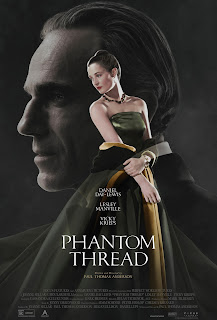This is reportedly Daniel Day Lewis' last movie and he is nominated for Best Actor, Best Supporting Actress, the film for Best Movie, and the director as well. It got some unexpected traction, in that it is about a fussy creative artist and the women who make it happen for him. The premise I suppose is that creativity requires a level of obsession in order to achieve greatness, and that those who have it need to be supported by others who give up their own autonomy in a way in order for the magic to happen.
The one actress who is not nominated is in fact at the center of it all. Reynolds Woodcock, oddly aptly named on a number of levels, seduces Alma (Vicky Krieps) early on, and the movie centers on their very unconventional relationship. Reynolds is used to having his sister facilitate his life, arranging for what he likes and discarding what he grows tired of. Alma speaks with a slight accent, maybe the actress' native Luxembourg accent, but her origins and her motivations and attractions are vague, beyond the obvious allure of being transformed into a beauty by the clothing her lover creates for her.
But this is not a film that has a conventional story line nor does the ending follow a clear and easy line; the war of wills
between the two characters does not have a tidy resolution. We don’t
even know just what it is that Alma wants, let alone what she gets.
The film itself is beautifully made, or maybe constructed is a better word. Director Paul Anderson’s visual style is
remarkable. Shooting much of the picture himself, he frames in a Kubrick-inflected style but cuts with an air of suspense. This gives the movie a sense of momentum
that’s supported by the
score and the other music (mostly classical) alternating with it. This
is very much a movie with a score; very little of it is without music, and
there are very deliberate shifts in instrumentation and orchestration
throughout that are subtle but create the mood. Well crafted, uptight and ultimately a little mysterious.

No comments:
Post a Comment